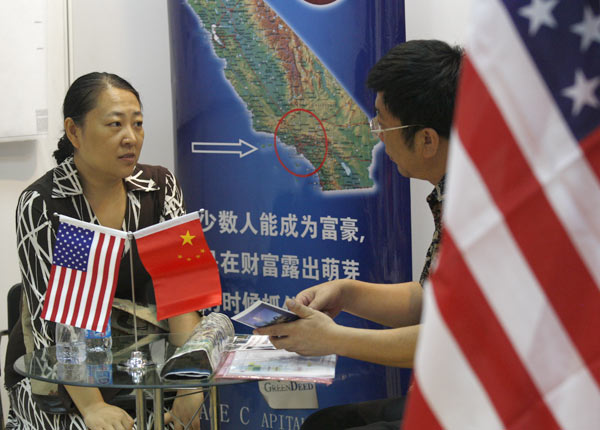
 |
|
A woman asks about a US real estate project at the 2012 Beijing International Property Expo/Autumn on Thursday. In a bid to attract Chinese investors, 147 overseas projects from more than 30 countries and regions are being represented at the event.ZHU XINGXIN / CHINA DAILY |
Immigration, asset relocation and education seen as main reasons to invest overseas
A growing number of overseas real estate projects are trying to attract Chinese investors, as global economic woes soften their own domestic real estate markets.
A record 147 overseas projects from more than 30 countries and regions are attending the 2012 Beijing International Property Autumn Expo, according to statistics from the expo's sponsor.
"China's housing market has great appeal to foreign projects, and we have had to extend the exhibition hall for foreign projects since we have so many of them," said Wei Kefei, director of the expo's international department.
The expo, which runs from Thursday to Sunday and has also attracted around 180 domestic real estate projects, is regarded as a barometer of the market.
According to Wei, immigration, education and asset relocation are the top three reasons for Chinese buying properties overseas.
The marketing chief of Patroclos, a Cyprus-based property development company, said 99 percent of Chinese people buying an apartment in Cyprus do so for immigration purposes.
Occupying 32 booths at the expo, Cyprus is the most prominent foreign exhibitor at the event.
As Canada, Australia and the United States have all increased their immigration requirements, more Chinese people are turning their attention toward Cyprus for permanent residence.
If a Chinese investor purchases a property valued 300,000 euros ($398,000) in Cyprus, they could receive the right to permanent residence in the country within two months. Usually, it takes three to six months to finish the procedure.
"As a member of the European Union, the terms offered by Cyprus are quite attractive for us, when considering education and traveling," said Lily Zhang, a 34-year-old company executive.
Property prices in Cyprus have fallen around 15 percent compared with 2007.
"So far, prices in the local market haven't been driven up by Chinese buyers yet, but this could happen next year," said Patroclos' marketing chief.
Pandra Richie, vice-president of Long and Foster Companies, a corporate real estate service provider in the US, said most Chinese interested in buying properties in the US would do so as their children are going to study in the nation.
Industry statistics show that in 2011, the number of Chinese visitors to Washington DC exceeded that of Canadians for the first time since records began.
Richie said a Chinese couple purchased an apartment valued at $260 million in Washington DC last year.
"The property market in some regions has been recovering, though at a slow pace," she said.
Nick Meijer, mayor of Zandvoort, a city in the Netherlands, said now is the best time to invest in the EU.
"The market is under correction, so property prices are down 10 to 15 percent. The cost of building has also dropped," he said.
Elliot Zhang, marketing executive at Central Equity, a Melbourne-based property consultancy, said Chinese buyers investing in Australia attached a great deal of importance to property value.
"The stable currency rate is also a significant reason attracting Chinese investors to Australia," Zhang added.
According to a recent report by The Economist, there are more than 1 million Chinese people whose individual assets exceed 10 million yuan ($1.6 million). More than 16 percent of those Chinese millionaires have already emigrated or have already submitted immigration applications, while 44 percent have plans to do so in the near future.
According to the Hurun Wealth Report 2012, 85 percent of Chinese millionaires plan to send their children abroad for education and about one-third of them have assets overseas.
These millionaires benefited from the rapid development of the Chinese economy. However, only 28 percent of them have confidence in China's economy in next two years compared to last year's 54 percent, the Hurun report showed.
Huang Tiantian contributed to this story.
Contact the writer at huyuanyuan@chinadaily.com.cn







